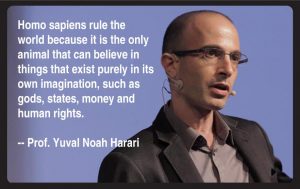

Maar voor de eerste keer in de geschiedenis zal ook de mens een revolutie ondergaan.

In de 21ste eeuw zullen er opnieuw revoluties zijn in de techonologie, economie en politiek.

Toch zal de volgende revolutie verandering brengen in deze geschiedenis. Onze gereedschappen en scholing zijn totaal verschillend van vroeger maar toch bleven de structuren van het menselijk lichaam hetzelfde. We hebben nogsteeds dezelfde lichamen, dezelfde hersenen en de zelfde gedachten als onze voorouders in China of uit het stenen tijdperk. Maar een ding bleef telkens hetzelfde: De mensheid zelf. TIjdens de geschiedenis waren er verschillende revoluties: In de technologie, economie en in de politiek. Professor Harari came to the Intelligence Squared stage to explain how the fictions that we believe in are an inseparable part of human culture and civilisation.ĭr Yuval Noah Harari legt uit hoe revoluties in de technologie onze maatschappij onze lichamen en hersenen zullen veranderen. It has become the most universal and efficient system of mutual trust ever devised, allowing the development of global trade networks and sophisticated modern capitalism. The fact that it is a ‘myth’ has not impeded its usefulness. In a similar vein, money is a fiction that depends on the trust that we collectively put in it. What made both of these societies work was the fact that within each of them everyone believed in the same set of imagined underlying principles. Yet the idea of equality, Harari will claim, is as much a fiction as the idea that a king or rich nobleman is ‘better’ than a humble peasant. Hammurabi’s was based on hierarchy, with the king at the top and the slaves at the bottom, while the Americans’ was based on freedom and equality between all citizens. To give an example, Hammurabi, the great ruler of ancient Babylon, and the US founding fathers both created well-functioning societies. In this exclusive appearance for Intelligence Squared, Harari will argue that all political orders are based on useful fictions which have allowed groups of humans, from ancient Mesopotamia through to the Roman empire and modern capitalist societies, to cooperate in numbers far beyond the scope of any other species. But what if modern civilisation were itself based on a set of myths? This is the big question posed by Professor Yuval Noah Harari, author of Sapiens: A Brief History of Humankind, which has become one of the most talked about bestsellers of recent years. We tend to think they’re a thing of the past, fabrications that early humans needed to believe in because their understanding of the world was so meagre. Want to join the debate? Check out the Intelligence Squared website to hear about future live events and podcasts: įilmed at the Royal Geographical Society on 23rd September 2015.


 0 kommentar(er)
0 kommentar(er)
